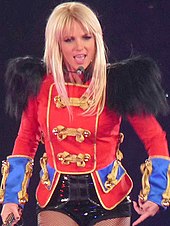Grammy Award for Best Dance/Electronic Recording
| Grammy Award for Best Dance Recording | |
|---|---|
| A gold gramophone trophy with a plaque set on a table Gilded gramophone trophy presented to Grammy Award winners | |
| Description | quality vocal or instrumental dance music performances |
| Country | United States |
| Presented by | National Academy of Recording Arts and Sciences |
| First awarded | 1998 |
| Last awarded | 2011 |
| Website | grammy.com |
The Grammy Award for Best Dance Recording is an award presented at the Grammy Awards, a ceremony that was established in 1958 and originally called the Gramophone Awards,[1] to recording artists for works containing quality vocal performances in the dance music genre. Honors in several categories are presented at the ceremony annually by the National Academy of Recording Arts and Sciences of the United States to "honor artistic achievement, technical proficiency and overall excellence in the recording industry, without regard to album sales or chart position".[2]
The award for Best Dance Recording was first presented to Donna Summer and Giorgio Moroder in 1998 for the song "Carry On". In 2003, the Academy moved the category from the "Pop" field into a new "Dance" field, which currently contains the category Best Electronica/Dance Album as well.[3] According to the Academy, the award is designated for solo, duo, group or collaborative performances (vocal or instrumental), and is limited to singles or tracks only.[4] Award recipients have often included the producers, engineers, and/or mixers associated with the nominated work in addition to the recording artists.
Justin Timberlake is the only artist to win the award more than once, with a total of two. Since its inception, American artists have been presented with the award more than any other nationality, though it has been presented to musicians or groups originating from the United Kingdom twice, and from Australia, the Bahamas, Barbados, France, and Italy once. Madonna holds the record for the most nominations, with five. Gloria Estefan holds the record for the most nominations without a win, with three.
History
Though she was not the first to suggest that the genre be recognized officially, Ellyn Harris and her Committee for the Advancement of Dance Music lobbied for more than two years to encourage the National Academy of Recording Arts and Sciences to acknowledge dance music.[5] Some Academy members debated whether dance music, with its heavy use of layering, remixing, "lack of melody or verse", and numerous varieties, was truly considered music. Others were concerned that dance music was not a long-lasting genre, fearing the category would face retirement much like the award for Best Disco Recording, which was presented for one year only at the 22nd Grammy Awards in 1980.[5]
In 1998, Harris' efforts paid off when the Academy first presented the award to Donna Summer and Giorgio Moroder at the 40th Grammy Awards for the song "Carry On". While the Academy had once been quoted as saying that "they considered dance music as something pop artists had created in their most frivolous moments", Ivan Bernstein, executive director of the organization's Florida branch, insisted that an award for excellence in dance music would not exist "if there were concerns about excellence".[5]
Recipients






^[I] Each year is linked to the article about the Grammy Awards held that year.
See also
References
- General
- "Past Winners Search". National Academy of Recording Arts and Sciences. Retrieved March 4, 2011. Note: User must select the "Dance" category as the genre under the search feature.
- "Grammy Awards: Best Dance Recording". Rock on the Net. Retrieved June 25, 2010.
- Specific
- ^ "Grammy Awards at a Glance". Los Angeles Times. Tribune Company. Retrieved April 24, 2010.
- ^ "Overview". National Academy of Recording Arts and Sciences. Retrieved April 24, 2010.
- ^ Paoletta, Michael (February 1, 2003). "Beat Box". Billboard: 37. Retrieved June 25, 2010.
For the first time, the best dance recording category is broken out into its own dance field. In previous years, this category was in the pop field...
- ^ a b "49th Annual Grammy Awards Winners List". National Academy of Recording Arts and Sciences. Retrieved June 25, 2010.
- ^ a b c "Grammys finally realize dance music will survive". Sun Journal. Lewiston, Maine: Sun Media Group. February 23, 1998. Retrieved July 22, 2010.
- ^ Campbell, Mary (January 7, 1998). "Rock veterans Dylan, McCartney face off for album of year". Pittsburgh Post-Gazette. Block Communications. Retrieved June 25, 2010. [dead link]
- ^ "1999 Grammy Nominees". NME. IPC Media. November 27, 1998. Retrieved June 25, 2010.
- ^ "42nd Annual Grammy Awards nominations". CNN. January 4, 2000. Retrieved June 25, 2010.
- ^ "43rd Grammy Awards". CNN. February 21, 2001. Retrieved June 25, 2010.
- ^ "Complete List Of Grammy Nominees". CBS News. January 4, 2002. Retrieved June 25, 2010.
- ^ "Complete list of Grammy nominees; ceremony set for Feb. 23". San Francisco Chronicle. January 8, 2003. p. 1. Retrieved June 25, 2010.
- ^ "Nominee list for the 46th Annual Grammy Awards". LiveDaily. December 4, 2003. Retrieved June 25, 2010.
- ^ "Nominee list for the 47th Annual Grammy Awards". LiveDaily. December 7, 2004. Retrieved June 25, 2010.
- ^ "The Complete List of Grammy Nominations". The New York Times. The New York Times Company. December 8, 2005. p. 1. Retrieved June 25, 2010.
- ^ "50th annual Grammy Awards nominations". Variety. Reed Business Information. December 6, 2007. Retrieved June 25, 2010.
- ^ "The 51st Annual Grammy Awards Winners List". National Academy of Recording Arts and Sciences. Retrieved June 25, 2010.
- ^ "The 52nd Annual Grammy Awards Nominees List". National Academy of Recording Arts and Sciences. Retrieved June 25, 2010.
- ^ "53rd Annual Grammy Awards nominees list". Los Angeles Times. Tribune Company. Retrieved December 2, 2010.
External links
